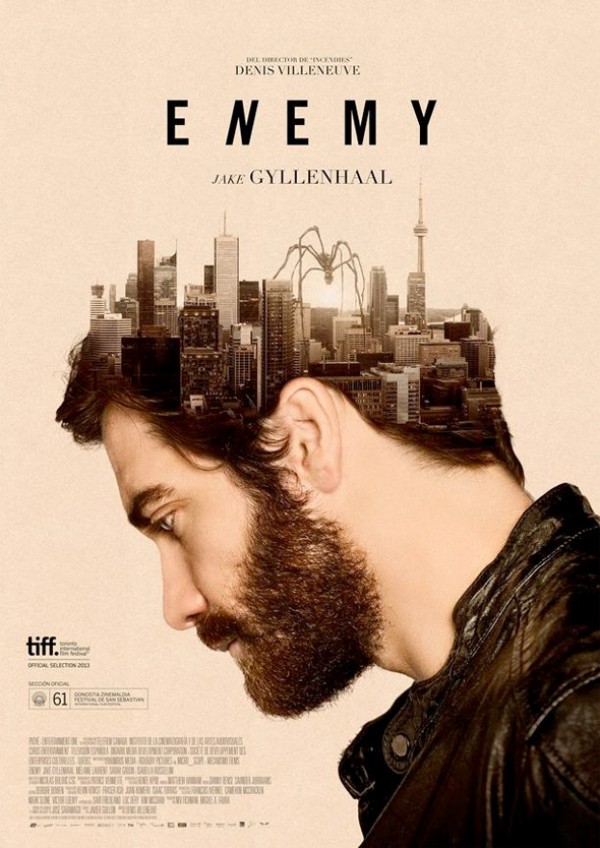ENEMY (2013, directed by Denis Villeneuve, 90 minutes, Canada)
NYMPHOMANIAC: VOLUME ONE (2013, directed by Lars Von Trier, 118 minutes, Denmark)
THE GRAND BUDAPEST HOTEL (2014, directed by Wes Anderson, 99 minutes)
 BY DAN BUSKIRK FILM CRITIC Denis Villeneuve’s new thriller Enemy is an irritating new film, which is both a function and a fault of its design. Shot in a urine-hued filter and played with a humorless hush, Enemy is meant to get under your skin. I don’t mind a film getting under my skin as long as it knows what it is doing under there. Director Villeneuve is so sure-handed in his creation of dull humming paranoia you want to believe he has a master design to his madness. But when he finally — and outrageously — plays his hand, Enemy reveals itself as an icy cool package undone by some sub-Shyamalan hoodoo.
BY DAN BUSKIRK FILM CRITIC Denis Villeneuve’s new thriller Enemy is an irritating new film, which is both a function and a fault of its design. Shot in a urine-hued filter and played with a humorless hush, Enemy is meant to get under your skin. I don’t mind a film getting under my skin as long as it knows what it is doing under there. Director Villeneuve is so sure-handed in his creation of dull humming paranoia you want to believe he has a master design to his madness. But when he finally — and outrageously — plays his hand, Enemy reveals itself as an icy cool package undone by some sub-Shyamalan hoodoo.
Jake Gyllenhaal is Adam, a zoned-out history Professor warning his students about the cold, emptiness of life in a totalitarian state, meanwhile his own state of existence is cold and empty. Represented in jagged, quick-cut visual rhythms, Adam’s world seems limited to teaching, having unsatisfying sex with his girlfriend, and sitting around drinking in his bare apartment. Watching a movie recommended by a co-worker, the cinema-averse prof spots a bit player on the screen who looks exactly like him. Adam tracks down his double, Anthony (also played by Gyllenhaal), and the pair play a cat and mouse game trying to figure out just what their relationship is to one another.
Based on a book by Nobel Prize-winner José Saramago (his novel Ensaio Sobre a Cegueira was made into the under-appreciated 2008 film Blindness) Villeneuve (working from a script by Javier Gullón) has changed the allegorical focus of the original story. Where Saramago’s novel dealt with how to handle the unwieldy aspects of one’s personality, Villeneuve’s Enemy hijacks the narrative and transforms it into an obtuse lesson about creeping totalitarianism, made painfully literal with fleeting imagery of man-sized bugs going about their business. Kafka receives no on-screen credit.
You could forgive Villeneuve’s overworked metaphor and sloppy allegory if there was something lively beneath his Kubrick-ian remove. It sure isn’t coming from Gyllenhaal’s unplugged performance given that Villeneuve’s portrait of an emotionally-constricted social state boxes him into endless terseness. The film is also full of the colorless, vague dialogue that gets across the repressive air of the society but also accedes to the aching dullness of life in a totalitarian state. The sense of disconnected place is strong throughout the film, channeling the same sort of palpable unease fellow Canadian David Cronenberg patented in the ’70s but never really re-purposing it. The film’s admittedly audacious climax should supply some diverting hours for those who like to tease out a director’s riddles but Enemy doesn’t reward you with much more than the sense of triumph that comes from completing the Daily Word Jumble.
– – – – – – – –
Lars Von Trier’s Nymphomaniac has finally landed after an extensive pre-release promotional campaign including a series of theater posters featuring the film’s stars naked and making their “O” face. The cruel joke of those orgasmic posters is that we’ve been kept from the climax by the cock-teasing commercial decision to cut the 269 minute film into two parts, with the theatrical version being shortened as well. Critics wouldn’t feel comfortable reviewing Gone with the Wind after stopping the film at burning of Atlanta and similarly it is impossible to know how successful Nymphomaniac is in this truncated state. Darn Magnolia Pictures for Kill Bill-ing us on this release.
the Wind after stopping the film at burning of Atlanta and similarly it is impossible to know how successful Nymphomaniac is in this truncated state. Darn Magnolia Pictures for Kill Bill-ing us on this release.
What we do see in Vol. 1 is certainly intriguing. Charlotte Gainsbourg, who starred in Von Trier’s Antichrist, is “Joe,” a mysteriously beaten and bruised woman literally pulled out of the gutter by Seligman (Stellan Skarsgard) and brought to recover on his sofa. There she tells a self-hating story (she literally calls herself “a bad person”) because of the path she has traveled as an admitted “nymphomaniac.” It’s new discovery Stacy White as the young Joe who does all the heavy lifting in Vol. 1, ever on the hunt for the next carnal coupling, although she doesn’t seem to find much pleasure in these endless and largely anonymous trysts. Von Trier gets some pleasure out of a catalog of oddball faces (as well as a montage of flaccid penises, you have been warned) but he is only intermittently interested in titillating us. Skarsgard’s Seligman constantly interrupts Joe’s sordid confession with ludicrous philosophical tangents in which he compares her orgiastic adventures to the well-motivated natural behaviors of fish and other assorted creatures in the wild.
Joe’s ravenous sexuality is presented as a riddle that may well be solved in Nymphomania Vol. 2 (scheduled to hit theaters next month.) From this blinkered perspective I’d say the epic exploration does not feel in tune with the specifics of feminine sexuality (bless you if you’re a woman who identifies strongly with Joe’s exploits) but instead, as I’ve long suspected, it is a view of Von Trier’s psyche through the prism of a female lead. While I’m troubled by Nymphomaniac’s butchered release strategy, I’m pleased that Von Trier remains a filmmaker who keeps us off-balanced enough to be consumed with the possibilities still unrevealed. Bring on Vol. 2, I say.
– – – – – – – – – – –
Finally caught up with Grand Budapest Hotel, tagging along was my nine-year-old, who’s become a Jeff Goldblum super-fan after seeing Jurassic Park and Lawrence Kasden’s 1985 western Silverado. I realized too that this is the third Wes Anderson film my kid has seen in the theater, with The Fantastic Mr. Fox and Moonlight Kingdom functioning sturdily as youth fare. Actually, The Grand Budapest Hotel pretty much does too, it’s like a big illustrated kid’s book sketched out in dazzling pastels.
 The action centers around a never-more engaging Ralph Fiennes as the cougar-banging Concierge Monsieur Gustave H and his lobby-boy-in-training Zero Moustafa (a lovable performance by Tony Revolori.) When one of Monsieur Gustave’s many octogenarian lovers dies and leaves him with an expensive painting, Gustave draws the murderous attentions of her son Dmitri (a handlebar-mustachioed Adrian Brody.) This leads the pair through many dangers, often at the hands of Dmitri’s assassin, J.G. (Willem Dafoe, seemingly having the time of his life.)
The action centers around a never-more engaging Ralph Fiennes as the cougar-banging Concierge Monsieur Gustave H and his lobby-boy-in-training Zero Moustafa (a lovable performance by Tony Revolori.) When one of Monsieur Gustave’s many octogenarian lovers dies and leaves him with an expensive painting, Gustave draws the murderous attentions of her son Dmitri (a handlebar-mustachioed Adrian Brody.) This leads the pair through many dangers, often at the hands of Dmitri’s assassin, J.G. (Willem Dafoe, seemingly having the time of his life.)
The girl tugging on Zero’s heart is Agatha (Saoirse Ronan of The Lovely Bones) who spend her days painstakingly constructing colorful pastries, which could easily serve as a metaphor for Anderson’s cinematic style. After recently watching some of the Technicolor musicals 20th Century Fox made around Carmen Miranda in the early 40s, I felt a parallel between their giddy spectacle and the pure escapism Anderson has been aspiring to as of late.
Despite Phawker’s editor’s recent declaration that we’re either Wes Anderson lovers or we lack humanity, I still feel a lingering unease with his children’s films for adults. Where his first cinematic salvo of Bottle Rocket, Rushmore and The Royal Tenenbaum‘s found him acknowledging the ennui of modern life, his later work is a bit emotionally numbed by its heavily-radiating adorableness. Real problems have seemingly melted away in a sugar-sweet bliss. It is a curious paradox, Anderson’s vision has entered a strata that is truly Heavenly, but as the Talking Heads once said, is Heaven really a place where nothing happens?

